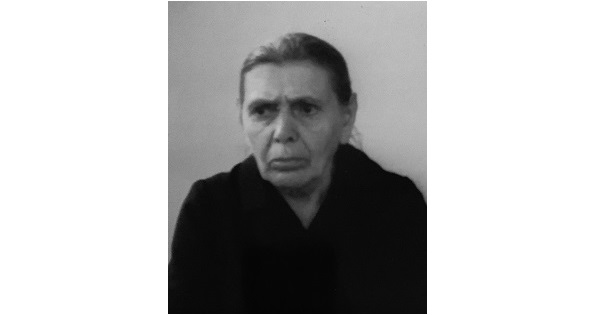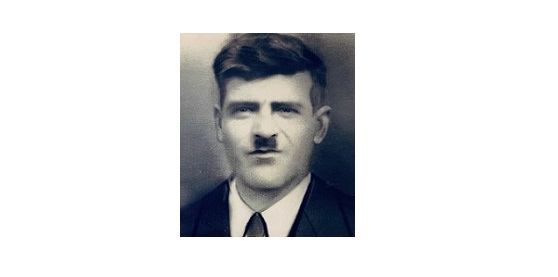
Kyriaki Dimitriadou (nee Arabacıoğlu) in Kavala, Greece in 1992.
Kyriaki Dimitriadou, nee Arabacıoğlu (1914-2002) was from the village Dogan Yuvasi in the region of Bafra. The following testimony was submitted by her grandson via our online questionnaire.
1. From which region of the Ottoman Empire were your ancestors from?:
My grandmother Kyriaki Dimitriadou was born in 1914 in the village Dogan Yuvasi in the Bafra region of Pontus.
2. How did their life change when the Neo-Turks and/or the Kemalists came to power? :
She was living peacefully with her brother and parents in the region. We don't know the exact dates, however I assume around 1922 (my grandmother would have been around 8 years of age) she along with her brother were forced to walk countless kilometers until they arrived at the closest port to embark on a ship that would take them to Greece. This was after her father died in the work battalions (Amele taburu) and the death of her mother who was murdered and robbed (along with others) by Turkish soldiers one day after she returned home from work. My grandmother had described to us how the Turks would come to their village and after observing all the young Greek girls throughout the day they would take them all into a house at night and rape them. Then in the morning they would set fire to the house and burn the house down with the girls still inside. She specifically told us how she would cover her ears at nights so she wouldn't hear the girls screaming while the Turks were raping them.
3. Were they deported during the genocide? If so, when, where to, and describe their experience:
Basically in order to survive they were forced to abandon the country. As I mentioned this must have happened around 1922. I don't know which port in Turkey they departed from. I only know that they arrived in Thessaloniki. My grandmother told us how they were forced to walk in groups throughout the night and to hide during the day to escape from the Turks. On most nights they were very hungry, dirty and barefoot.
4. Were they held in a concentration camp or labor camp? If so, where was it located and describe the conditions :
Yes, my grandmother's father was, for two years until he died from being overworked and a lack of food. I don't know anything more than that.
5. Did they lose family and friends? If so, how did they cope?:
My grandmother along with her brother who was 2-3 years older than her lost both their parents and so were forced to flee to Greece. During their attempt to escape, along the way and during the panic they lost one another. Despite this, God helped them and at a later point in their journey while everyone stopped for water they noticed one another. There was so much panic and hardship that the brother only recognized his sister after asking her for confirmation as to whether she was indeed his sister Kyriaki.

Kyriaki's husband Haralambos Dimitriadis. Kyriaki met and married Haralambos in Kavala Greece. Haralambos was form a neighouring village in Turkey called Doğankaya. His family had a similar experience but the exact details are not known with certainty. Haralambos died in 1944 after Bulgarians killed him during the Greco-Bulgarian war.
6. Did anyone within Turkey including Turks try to help them during the genocide? :
My grandmother told us that en route to the port a Turk (despite my grandmother being very young) tried to kill her with a gun. He wasn't a soldier. Luckily another Turk who witnessed this prevented it from happening at the last moment by telling him; "Are you going to kill a non-believer so that you can say it with pride throughout your entire life?" And so my grandmother was saved only moments before embarking on the ship that was to take her to Greece.
7. How did they cope emotionally with their genocide experience? Did it affect the remainder of their life? :
I can't say how my grandmother's life would have turned out if she had't lost her parents and if she continued living with those people in Turkey. It may have been good, it may not have. However what's for certain is that the genocide of the Greeks from the region of Pontos by the Neo-Turks and the Kemalists definitely led to them losing their homeland and their wealth, something very momentous for a child of 10 years. They came to Greece as two young children completely alone and were forced to go from the port of Thessaloniki to some village in Kavala (Dysvato) where they learned that all of their fellow village folk from Turkey had been sent as well as some of their distant relatives from Turkey. They were forced to live in very poor conditions applying themselves to the field of agriculture. My grandmother later married and had 4 children however she lost her husband Haralambos Dimitriadis very early. Haralambos was also from Pontos from a village called Doğankaya in Bafra and died during the Greco-Bulgarian war. As a result she was once again forced to live in solitude raising her 4 daughters with many deprivations. She decided not to remarry for understandable reasons (she had 4 daughters).
8. Did the denial of the genocide by the perpetrator (the successor state of Turkey) affect their ability to form closure?:
I don't know.
9. How did they feel about Turkey after the genocide? :
Every time she would describe her experience with the Turks (she usually avoided it) she would shake the lapels of her robe a well-known Greek mannerism which described repugnance. The one thing that impressed me was that throughout the entire length of her life she never showed an interest in visiting the place of her birth. Of course she had her reasons, reasons which we never learned about.



